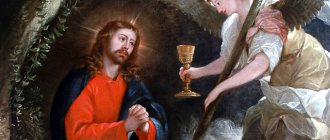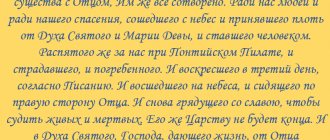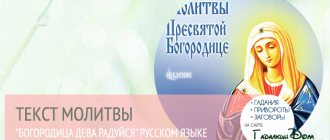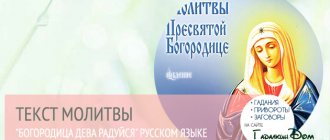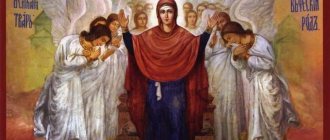Text of prayer with accents
When getting acquainted with the prayer, you should read it in the original, with the correct emphasis. This is important so as not to distort words, distorting the meaning.
Text of the prayer in Church Slavonic with accents:
Our Father, who art in heaven! Hallowed be Thy name, Thy kingdom come, Thy will be done, as it is in heaven and on earth. Give us this day our daily bread; and forgive us our debts, just as we forgive our debtors; and do not lead us into temptation, but deliver us from the evil one.
This is how the words of this prayer are pronounced. Believers who attend church hear the clergyman pronounce the words and adopt it.
If certain phrases seem incomprehensible, you can ask the priest for an interpretation. He will happily enlighten parishioners and help them understand the essence.
What prayers can children read?
When the kids grow up, they themselves will be able to carry their children’s prayers to God. By explaining why they are being done, you can tell them that the Almighty is an infinite and loving force that protects and helps to live for all things. You can start with simple prayers such as the Lord's Prayer and then teach them in the morning, before/after meals and in the evening.
How to read the Lord's Prayer correctly?
The main thing when saying a prayer is awareness. If a person does not understand the words, he will not be able to experience this subtle and amazing process.
Saying: “Thy kingdom come,” a person does not understand what this means. He does nothing to bring the kingdom closer, does not prepare himself, does not confess, but lives in sin.
Such a prayer can hardly be considered sincere, coming from the soul.
When reading prayers, you need not only to understand their meaning, it is important to make efforts in your daily life so that the text of these prayers is sincere when coming from your lips.
What does this mean:
- Try to sin less.
- Skip the extra piece of pie if you're full.
- Feed the tramp.
- Don't respond to rudeness.
- Avoid swear words in speech.
- Don't do harm to others.
- Forgive everyone, do not hold evil in your soul.
- Confess and take communion.
- Visit the temple.
- Pray regularly. You will be surprised what inner strength faith gives.
- Remember: fornication, gluttony, drunkenness, taking the name of the Lord in vain are sins.
Try to become purer spiritually, and you will become healthier and stronger physically and mentally. Great strength is required for a person so that, living in the temptations of the Fall, not succumb.
Your every abstinence will strengthen your spirit. And the words of prayer will become more understandable and correct from the lips of a person who understands what he is talking about and strives to live according to the laws of God.
In essence, faith teaches us kindness, understanding, and forgiveness. All this will allow you to live with a light and pure soul, without evil, envy and fears. Fear is a manifestation of cowardice.
A believer must humbly accept everything that the Lord has prepared for him.
Acceptance of the inevitable, from a psychological point of view, is the surest way to adapt to the situation, to avoid internal discomfort and feelings of regret.
The meaning of the Lord's prayer "Our Father"
When reading the Lord's Prayer, people turn to the Almighty with requests and gratitude. It is the first step to faith and helps people clear their thoughts and avoid mistakes.
In the most important book for every Christian - the Bible - it is mentioned that the author of the prayer addressed to the Lord is His son Jesus Christ.
It was He who left His disciples-apostles and all people as a legacy of special words that help to concentrate on faith and begin communication with the Creator.
It is believed that in homes where there is faith, prayer sounds and there is reverence for the Almighty as the only Creator, peace and tranquility reign, prosperity increases, the health of those living in it strengthens and well-being grows.
As soon as believers stop praying, demons immediately take up space in the soul, and then begin to send negative thoughts, provoke them into bad deeds and negative actions. “Our Father” is a very strong and effective prayer, it is this one that is given to a person to help him from evil and all the negativity in life.
“Our Father” is a very powerful and effective prayer.
Explanation of prayer for children
Baptism of babies is a beautiful and natural process. Most Orthodox people try to give the child the protection of higher powers as early as possible by performing the rite of baptism.
When kids grow up and begin to read on their own, they are taught prayers.
Important! The meaning of prayers should be explained when the child is able to understand them. This can happen at 4 years old and at 10 years old. All children develop at different rates. Awareness comes at different times. If the child is able to learn the text, you should talk to him about its meaning. Ask your child how he understands the words of the prayer. Listen and explain each line separately.
Explanation of the words of the Lord's Prayer in simple words for children:
| Words | Meaning |
| "Our Father, who art in heaven" | Appeal to God who lives in heaven. When they talk about heaven, they don't mean heaven. Pilots and astronauts do not see God there. He lives in our hearts, in good deeds, in prayers. It is invisible, like love and mercy. We don't see them, but they are there, we feel them |
| "Hallowed be Thy Name" | May the name of God be glorified in the world, among people |
| "Thy kingdom come" | Let love, peace and joy reign on earth - so the Lord commanded. His kingdom is life according to the laws of God, people following his commandments. Which means peace and joy |
| "Thy will be done" | Let God's will reign on earth |
| “As in heaven and on earth give us this day our daily bread” | During life and after death, the Lord will not leave us, he will give us what we need. This is not only bread in the literal sense of the word. We are talking about what a person really needs: spiritual and worldly food |
| “Forgive us our debts, as we forgive our debtors” | A request to forgive us our sins, and a promise to also forgive everyone who does us harm: everyone without exception |
| “And lead us not into temptation, but deliver us from evil.” | Do not give us the temptation to sin, protect us from sinful thoughts, protect us from all evil. |
| “As is your power and glory forever and ever” | May the people glorify the name of the Lord and his holy teachings at all times |
| "Amen" | Let it be so |
Help your child understand the meaning of prayer, and he will begin to pronounce these words consciously. This will bring him closer to a righteous life.
If from an early age a child understands the essence of faith, it will be easier for him to make the right choice and decisions. Faith gives strength, wisdom and peace.
Believe, pray, teach your children to do this. They will make their choice regarding religion themselves, at a more mature age. The task of parents is to explain the essence to the child, giving a choice.
“Our Father” with children: home lesson
Part 1: “Our Father” with children: prayer as the rhythm of life
See text
Our children, who grew up in the Church, can know the words of prayers by heart. Some, especially those who remember, can even read all the evening prayers without a book, and immediately pronounce ornate phrases like “the blessing of the air” or “the Only Begotten, born of the Father before all ages.” But the ability to pronounce such phrases, even the ability to translate them “into Russian,” does not always mean understanding the meanings and meanings of these words.
The text is familiar... like “Our Father.” That is too familiar
It is the Lord’s Prayer, a prayer that every Christian anywhere in the world usually knows by heart, that can show how far the ability to “say” a prayer is sometimes separated from the prayer itself and from understanding its meaning. The text is familiar... like “Our Father.” That is, too familiar. Our children know the words of this prayer from infancy, and these words are fused in their heads - and often in our heads too - into a single whole, into a set of words that we pronounce almost automatically.
Probably, in studying the Lord’s Prayer, our first task is simply to see with “fresh eyes” this native and familiar text. Show children these familiar words as words that generally have some meaning.
To do this, we can write out each phrase of the prayer on a separate sheet of paper (thick sheets for drawing, A 4 format).
The first phrase is “Our Father.” Let's write it out beautifully. We wrote in Church Slavonic, but you can, of course, write in Russian letters or in Russian. We got 12 sheets with the following words:
- Our Father, who art in heaven!
- Hallowed be Thy name,
- may your kingdom come,
- Thy will be done as it is in heaven and on earth.
- Give us this day our daily bread;
- and forgive us our debts,
- just as we also leave our debtors;
- and do not lead us into temptation,
- but deliver us from evil.
- For Yours is the Kingdom
- and strength
- and glory
- forever. Amen.
When the habitually united words of prayer are divided into separate petitions, there is a chance that the child will pay attention, see, and feel these words.
Words that mean something
For teenagers who, as they think, “have known everything for a long time,” it can be useful to see these familiar words in another language. This is how a familiar word unfolds, opens up, reveals its meaning. In this case, we turn to the Greek language - in fact, practically the original source.
There is nothing very complicated here: Our Father ‒ Πάτερ ημών <Pater imon>. Pater is a word familiar to children: hence Chesterton’s “Father Brown,” hence the word “patericon.” A little differently, a little from the other side - and now the habitually illegible phrase “Our Father” begins to live.
In heaven ‒ ὁ ἐν τοῖς οὐρανοῖς <о en tis uranis>. Uranus is the sky in Greek, also a familiar name from Greek mythology, and at the same time a little from astronomy. It seems like a completely different steppe - but the main thing is that the child sees the familiar roots of words. And again the perception of an all too familiar phrase is “refreshed”.
If children are even slightly interested in languages, this approach to the ancient, mysterious Greek language can be incredibly interesting and exciting.
When I myself was about fifteen years old, as they say, a girl who grew up in the Church, it was with the help of turning to ancient Greek texts that I suddenly saw the meaning of many native prayers. It was a revelation for me. It turned out that the familiar and seemingly understandable have unknown depths that are important and interesting. It seems to me that it is important for a “church” teenager to encounter such things.
During adolescence, everything “homey” can become synonymous with “uninteresting.”
If the Greek text is the primary source, it is “antiquity” and “depth”, then the other pole of the “unfolding of meanings” of the text is an appeal to the English language. This is a movement towards “modernity”, relevance. And this is more a question of understanding translations and the meaning of words. After all, Greek is not accessible to everyone, but English is studied at least in any school, and even in all kinds of courses. And by the sixth, and even more so by the ninth-tenth grade, teenagers already have at least some command of this language. And we translate: Our Father. And suddenly – really suddenly! - it turns out that “Our Father” is an appeal to our Father. “Give us this day our daily bread” - English vocabulary at the level of the fourth grade, or even the third. The habitual, unconscious, merged into one spaceless phrase “Give us our daily bread” turns out to be a request to give us daily bread. All this, in my opinion, is a very necessary thing for a “church” child.
Prayer, like all other components of Orthodox culture, is perceived by a “church” child within the framework of “their” and “home” - and this is great. But at a certain point, in adolescence, everything “homey” can naturally become synonymous with “uninteresting” and “already passed.” And just with the help of such a translation into English, this “home” suddenly breaks out of the boundaries of “home”, crosses the boundaries of cultures and continents, rises above the entire universe, like something new - while remaining thereby native and rooted in its native home, in native childhood.
Therefore, turning to the study of the Lord’s Prayer, the children and I wrote separately on separate sheets of paper in large beautiful letters each phrase of the Lord’s Prayer in Church Slavonic - and next to it the same phrase in Greek, and the same phrase in English. So we ended up with 12 posters written in three languages. The kids did not understand anything in this writing, the elementary school students only understood Russian and a little English, the older ones understood everything except Greek - but Greek turned out to be interesting to read and understand. It turns out that the written text “works” for any level of development and education.
Illustrations for each phrase of the prayer
In order to “master” these phrases more, and to make it look beautiful and interesting, I invited the children to decorate these posters. The children themselves chose the phrases they would like to illustrate. And what exactly to draw - the children also decided for themselves.
And there is something to think about. “Our daily bread” - of course, bread. This phrase was illustrated by a five-year-old girl. On the margins of this poster she depicted flowers and her favorite “owl”: not in the subject, but in the direction of accepting and mastering prayer in general.
How to depict the words “Thy will be done”? While a person is thinking about this question, he is also thinking about the content of the phrase. This means he thinks about the meaning of prayer, keeps in his head the words of the Holy Scriptures, the words of the Lord. This means that we have already made at least a little progress and helped the child think about the content of the main prayer of our life. A child (not quite a child - almost a 14-year-old man) came up with the idea of depicting a hand that turns a scroll to the ground - like the hand of God offering people the Divine will.
Every phrase turns out to be a reason to think a lot and seriously
As expected, references to Holy Scripture also appeared in the illustrations. “Our Father” is an association with the parable of the prodigal son (cf. Luke 15). “And forgive us our debts...”: again the parable of the evil lender (Matthew 18:23-35).
When it came to illustrating “and glory” from the final part of the prayer, the eleven-year-old remembered the vision of the prophet Ezekiel that we had read about several months before. A very impressive vision - then we drew the children’s attention to the “Savior in Power” icon, which depicts symbols from this mysterious vision. So on the poster with the words “and glory” we had wheels with rims “full of eyes” and heavenly beings - “each has four faces, and each of them has four wings; and their feet are straight feet, and the soles of their feet are like the sole of a calf” (Ezek. 1:4-7). So they remembered not only the New Testament, but also the Old, and turned to the iconography.
In general, every phrase turns out to be a reason to think a lot and seriously. It is not so important what exactly the child draws - by drawing we make the phrase visual, by drawing the phrase seems to be affirmed, reinforced, again and again forcing us to refer to the meaning of each word. Even a bit. At least somehow.
Interpretations of the Holy Fathers
So, we have prepared 12 posters, painted with our own hands, with our own brushes, pencils, felt-tip pens and gel pens. Now we can take an even more advanced approach to studying the text of the prayer - we will read the interpretations of the holy fathers.
The Fathers left us many thoughts about the Lord's Prayer. These are the interpreters listed by Saint Theophan the Recluse: “Tertullian (before the fall), St. Cyprian, St. Gregory of Nyssa, St. Cyril of Jerusalem (in the 5th secrecy word), St. Chrysostom (in conversations on the Gospel of Matthew, and in a conversation on the words: “the narrow gate, etc.), St. Cassian in the 9th interview, bl. Augustine (in his treatise on the Lord's Discourse on the Mount, in words 56, 57 and 58, and in letter 130), St. Maxim the Confessor, Blessed. Theophylact (in the interpretation of the Gospels of Matthew and Luke), Simeon of Thessalonica and our newly-minted wonderworker, St. Tikhon of Voronezh, Zadonsk (in 3 volumes).” Saint Theophan the Recluse himself did a great job - he collected the interpretations of all these teachers and fathers in one book (“Interpretation of the Lord’s Prayer “Our Father” in the words of the holy fathers”), carefully brought these interpretations literally under every word of the prayer[1].
There are more modern interpretations. This is St. Nicholas of Serbia, Metropolitan Veniamin (Fedchenkov). You can also find sermons and reflections of living priests, bishops, and theologians.
From the holy fathers, we ourselves took the interpretation of one Saint John Chrysostom. “Authoritative classic”, and figuratively, emotionally and understandably. And not as highly ascetic as other holy fathers: after all, Chrysostom’s interpretation is a sermon delivered in an ordinary city church, addressed to ordinary laymen.
We can study the phrases of prayer one by one, one after another. For this purpose, we hang the prepared posters in a visible place. It seems to me that the most convenient place is somewhere above the dining table. This way, this phrase will be in sight all the time, so we won’t forget about classes, and so we can refer to the text during the discussion. A “prominent place” can be a refrigerator - you can attach anything to it using magnets. When we lived in an apartment, my refrigerator was my main teaching and visual surface. Now we live in our house, and in the dining room near the dining table we have an easel on which I set up all such “visual aids.”
Lesson during dinner
We start with the first phrase: “Our Father.” So, on our easel we have a poster with this text, and during a common dinner we refer to this phrase.
We prayed and sat down at the table. The food is laid out on plates, the children begin to eat - and we read the interpretations. It’s simple: we put a book on the window sill in the dining room in advance, and bookmarked the necessary pages. And when the children and husband start eating, before joining them, I reach out to the windowsill, open a book (or, when necessary, the Internet on a tablet) and just read out loud.
This reading can only take a minute: even the food does not have time to cool on my plate. Here is St. John Chrysostom’s interpretation of the phrase “Our Father,” or rather, even the word “our” in this phrase: “...with these words He teaches us to pray for all the brothers. He does not say: “My Father, who art in Heaven,” but “Our Father,” and thereby commands us to offer prayers for the entire human race and never have in mind our own benefits, but always try for the benefits of our neighbor. And in this way he destroys enmity, and overthrows pride, and destroys envy, and introduces love - the mother of all good things; destroys the inequality of human affairs and shows complete equality between the king and the poor, since we all have equal participation in the highest and most necessary matters”[2]. Expressive reading of this text takes about a minute. Just 60 seconds before dinner, during dinner, is not a waste of time at all, it is not at all difficult even for someone who is allergic to reading aloud (this sometimes happens to teenagers). If Chrysostom seems florid, you can choose something else, take the text of any modern preacher - having access to the Internet, it is not difficult to choose a text “for every taste and income.”
Immediately, right during dinner, if you wish, you can discuss what you read. Often in this case we discuss something not with the children, but with the husband - the children just listen. And sometimes they don’t listen – no big deal. But they are present, and this is already a great thing. The main thing is done: the seed is sown.
And in such a situation, children see that for us, parents, all this reading and interpretation is important, interesting, we are able to talk about these topics with each other.
And this is really important to us. We teach children, we explain the words of prayer to children - but in the same way we explain this prayer to ourselves. We teach children and teach ourselves at the same time. We teach children - and at the same time, thus, we find the opportunity to honor at least a little of the holy fathers. Great job!
To have variety, to return to the same phrase of prayer several times, we read interpretations from other authors. Today we honored John Chrysostom. And tomorrow we open the interpretation of this same phrase, but from St. Nicholas of Serbia. If for Chrysostom interpretation is a sermon, it is theology, it is a call to action, then for Nicholas of Serbia the interpretation is rather poetry. This is a whole poem with the most unexpected images, examples, colored with bright and fresh colors: “When the heavens rumble and the oceans roar, they call You: Our Lord of hosts, Lord of the powers of heaven! When the stars fall and fire bursts out of the earth, they say to You: Our Creator!” - the Serbian Chrysostom interprets and sings this prayer with similar words. Saint Nicholas has talking camels, and talking stones, and small stories, and all this is an interpretation of the Lord’s Prayer. When the thoughts of Nikolai Serbsky seem to me too long to read to children at the table, I shorten something as I read. For example, I only read a couple of paragraphs.
In order for the diversity of interpretations to become completely diverse, we do not end here by addressing one phrase of the prayer. The next day - or maybe in a couple of days, as it turns out, as convenient as it is - we discover a completely different author. This is “Reflection on the Lord’s Prayer” by Igor Sikorsky. The same great aircraft designer, creator of the first in the world: the four-engine aircraft “Russian Knight”, the heavy four-engine bomber and passenger aircraft “Ilya Muromets”, the transatlantic seaplane and the serial single-rotor helicopter. The legendary aircraft designer was not only a church-going, deeply religious Orthodox Christian, but also a serious spiritual writer[3]. His reflections on the Lord's Prayer are interesting primarily because of the fact of their existence.
When my children and I talk about the Lord's Prayer, we remember the Fathers of the Church - the saints who lived centuries ago. And in general, bishops, priests - the “religious” area. And then it turns out that the cool techie after whom the helicopters are named is talking about prayer. This is again an entry into modernity, an entry into the relevance of the topic - and again an important point in a conversation with teenagers.
But Sikorsky’s reflections are interesting not only because of their existence, but also because of their content. This text is written easily, is also easy to read, and is replete with references to literature and history. Of course, this is not surprising, but still unexpected: in Sikorsky’s reflections on the Lord’s Prayer, analogies with machines, mechanisms, facts from the field of physics, hypotheses from astronomy and biology, and other similar unexpected things constantly emerge. And all this happens organically and by the way.
Of course, Sikorsky’s thoughts are not interpretations of the holy fathers, they are just a personal opinion. But this is the personal opinion of a very interesting, deep and erudite person. An opinion that will most likely be interesting to hear for both dads and boys. An opinion that you can think about, which you can argue with, which can and should be correlated with the statements of the holy fathers - that’s why we read the “authoritative” teachers of the Church at the beginning of the conversation. It turns out that Sikorsky’s thoughts - and I don’t read everything out loud, just what I think is necessary - cause the biggest discussions at the table.
When irritated, you should never talk to children about “religious” topics.
So in a week we “go through” one phrase from the “Our Father” prayer. Sometimes a “lesson” on just one of our posters takes more than a week. After all, we try to read something, discuss it when we are together, and this is not always possible. There are days when our dad or older children return home too late - and we cannot sit down at the table all together, and in this case we postpone reading until another time. It happens when children are too tired or too excited - we notice that reading will be inappropriate, the children simply will not hear us, and reading is postponed again. It happens that we are all busy discussing something else - and then we again postpone thinking about prayer until another day. And there are also days when we, parents, are irritated and twitchy. I rarely find myself in this state, especially just in the evening... When irritated, I am sure that you should never talk to children about “religious” topics. So mom is on edge - and again the conversation about prayer is postponed. So it turns out that we can talk about the same phrase for a couple of weeks. But we are in no hurry. Thank God that at least sometimes such reading is possible. Even if reading just once a week is already great, this is already a chance for all of us.
And, by the way, it is even possible to schedule such lessons for one specific day of the week. For example, reading on Saturday evening is a good move towards church, especially if you cannot attend the All-Night Vigil. Or read it over Sunday lunch after returning from the liturgy. Even if such a reading stretches out for six months, is it really scary? It’s great to read at least something from the Holy Fathers for six months at least once a week, and to think about the Lord’s Prayer for six months at least sometimes!
As we wanted, as it turned out, we read and thought about one phrase of the prayer - we move on to another: we attach another poster near the table, again open the interpretation of Chrysostom... And so, day after day, week after week, without rushing anywhere, we return to prayer again and again The Lord's.
Of course, you can organize something other than a “table lesson”. But it seems to me that this is a very organic form of home education - it is not without reason that for thousands of years table symposiums have been a form of education, including family education.
It works very simply. Evening came, we sat down at the table - which means we all got together. And since everyone is sitting at the same table anyway, why not take advantage of this situation? If you introduce the custom of reading at the table from the infancy of the first children, then this tradition will become a natural part of life at home. As a tradition to sit down at the table in general. As a tradition, eating from a plate using a fork is exactly the same “artificially” introduced, purely cultural tradition that we have simply become accustomed to since childhood.
Let us believe ourselves - there will be an opportunity to pass on this faith to our children.
Sometimes teenagers, the same age as older children, stay with us for several days. And if they attend such an “educational dinner,” they react quite normally - they sit and listen. Or they pretend to listen. Since they have ended up in our “body”, in a “foreign monastery”, since they generally like it at our home, they accept all the customs of our life as a given. Our children grew up in this - it’s customary for us. And other people's children accept this - after all, those with whom they want to be close do so. This is how the mechanism of educating children works with the help of the “rhythm of life” of the family. There are no guarantees that all this education will germinate and bear fruit - unfortunately, there are no such guarantees. And we will count the chickens in the fall, which has not arrived while we are alive. But this is how chances appear. For the sake of these chances, we teach our children something.
However, good reading, a good conversation can only develop when we read not for the sake of “religious education of children”, not for the sake of fulfilling “parental duty”, but for ourselves. Because it’s important to us, it’s really interesting to us. Children cannot be deceived - they see this interest of their parents. When an attachment is formed between parents and children, the parents' interest in anything literally infects the children. And actually this parental interest may turn out to be a more effective teacher than all the smart words that we utter. So, as always, the cornerstone is the same: we will strive to educate ourselves - and this way we will be able to provide an education to our children. Let us believe ourselves and there will be an opportunity to pass on this faith to our children. We will pray ourselves - there will be an opportunity to teach children how to pray. Without this, all our education is chatter, scholasticism, tediousness and necessarily a violation of the commandment “parents, do not provoke your children to anger” (Eph. 4:6).
***
And pray and study. And, having studied, pray again. This is what happens with the Lord’s Prayer. After all, we have been reading it “all our lives” - and now we are studying it. We pray, we sing this very prayer before eating - and while eating we read about it, analyze it into fragments, into words, into ideas. And then we put it together again - we sing this same prayer again during evening prayers. Then tomorrow we will sing - both in the morning, and before meals, and in the evening. And in the temple we will sing, together with all the people. And then - home again. And again we will read and analyze. Let's see, the months-long home "lesson" will end - but the prayer will remain.
Let's hope that for us and for each of our children, saying the words of prayer will truly become prayer. At least someday it will become an appeal to God, to the Living God, to our Father who exists in Heaven. Whose name we will try to glorify with our entire home. And the Kingdom of which we, together with our children - and when the children are completely grown up, then probably separately, but still together - we will call and expect.
